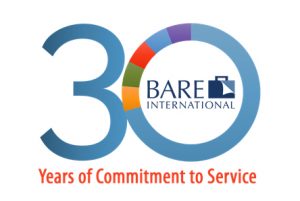Founders of BARE International reveal hurdles and triumphs on their road to success.

Part 2: Going global and the impact of 9/11.
As communications specialist Ellen Pochekailo continues her 4-part interview with Mike and Dale Bare, we learn how Bare International jumps the pond, expanding into Europe and beyond. We also learn how the 9/11 tragedy impacted their business and prompted expansion into new markets.
What inspired you to take that first step into the international arena?
Mike – In 1996, we won a national contract with Hilton Hotels—450 hotels throughout the U.S. About four years into our contract, they referred us to their sister organization, Conrad Hotels, who asked us to evaluate their flagship Conrad property in Belgium. The Conrad executive team was impressed by the quality and thoroughness of our reports and quickly realized the value of our services. They asked us to provide research for all their properties, including those in Cairo, Istanbul, Singapore, Hong Kong and London. This was a huge undertaking for us, but we were thrilled at the opportunity.
I was especially excited about the chance to visit and work in these amazing cities. As we began to recruit evaluators and set up services for Conrad Hotels, we saw an opportunity to expand our brand. Developing our capabilities on a global level significantly leveraged our position in contracting with international companies … which led to further expansion. Today, we operate in 150 countries, conducting worldwide customer experience research for a broad range of global clients.
What were some of the challenges and how did you overcome them?
Dale – We faced a variety of challenges as we expanded into foreign markets, but I’d have to say the top three contenders were language, finance and cultural differences. We tackled the first hurdle by hiring staff with multi-lingual skills. The financial complexities we addressed with crash courses in the various currencies, regulations and legalities. And the cultural nuances … well, learning and adapting to customs and perspectives that are often quite different from our own—that is an ongoing process.
How does field research in other countries differ to the U.S.?
Mike – Each country has it’s own approach to doing business that is highly influenced by its culture. For example, some cultures believe the management level equates to a position of status that entitles you to do less. At Bare, we’re very hands-on, so we expect more from our managers. In some countries, a sense of urgency means to make it a priority tomorrow instead of today. In others, three days of deliberation are required before taking action. This can be challenging because our goal is always to be efficient and prompt in our delivery.
Even when we’re talking the same language, we’re not always saying the same thing. But we’ve made a dedicated effort to continually improve communications and view things from culturally different perspectives. I even became a Brazilian citizen for several years.
Dale – It’s been an incredible experience to work with people around the world. We’re in a unique position to pool novel ideas, best practices and successful approaches in each country and share them on a global level. We’ve learned something new from every culture, which has strengthened and enhanced our entire company.
What motivated your expansion into other industries?
Dale – Necessity. Up to 2001, we focused on what we knew – hospitality. Then the 9/11 tragedy happened and the hospitality industry plummeted. People were afraid. They stopped traveling, staying in hotels, going to restaurants. Like everyone else in the industry, we took a big hit. We were fortunate to have entered the global market, which helped us stay afloat, but we had to rethink our vision, and we had to do it fast.
In addition to a flattened hospitality market, the country was also experiencing an economic slowdown. So we started to think of industries that were necessary to every day life—industries that might be affected by the slowdown, but would continue to exist. We turned to banks, retail, grocery stores and automotive services.
Mike – Although we needed to expand our expertise and recruit new evaluators, many of the same principles of hospitality applied to these new service industries. A positive customer experience is all the more important when the economy is bad. Many of the businesses we approached realized this and started to contract our services.
Our expansion efforts were so successful, we developed a whole new client base that we continued to serve and broaden even when the hospitality business started to rebound. Today we provide customer experience research in over 15 different industries.
As a global organization, how do you maintain quality in staff, auditors and services?
Mike – Clear, continuous communication is imperative, as well as maintaining consistency throughout our company. We set the bar high and make sure everyone knows what’s expected and stay in close touch with each office, keeping the lines of communication open.
We also value our employees and invest in their success, provide training, encourage input and initiative, explain what it takes to be successful, and celebrate their achievements. Bare wants everyone to feel included, to know they are integral to the organization.
Dale – Our focus on consistency and communication extends to our relationship with evaluators both nationally and internationally. It’s critical to provide clear expectations upfront. Each evaluator receives client-specific guidelines and feedback. We also use a multi-tiered quality assurance process to ensure compliance, effectiveness, delivery and accuracy.
This concludes Part 2 of our interview. Watch for the Part 3, in which Mike and Dale share insights on their role in the industry and the impact of customer experience research on business today. Missed part 1? Catch up here!
